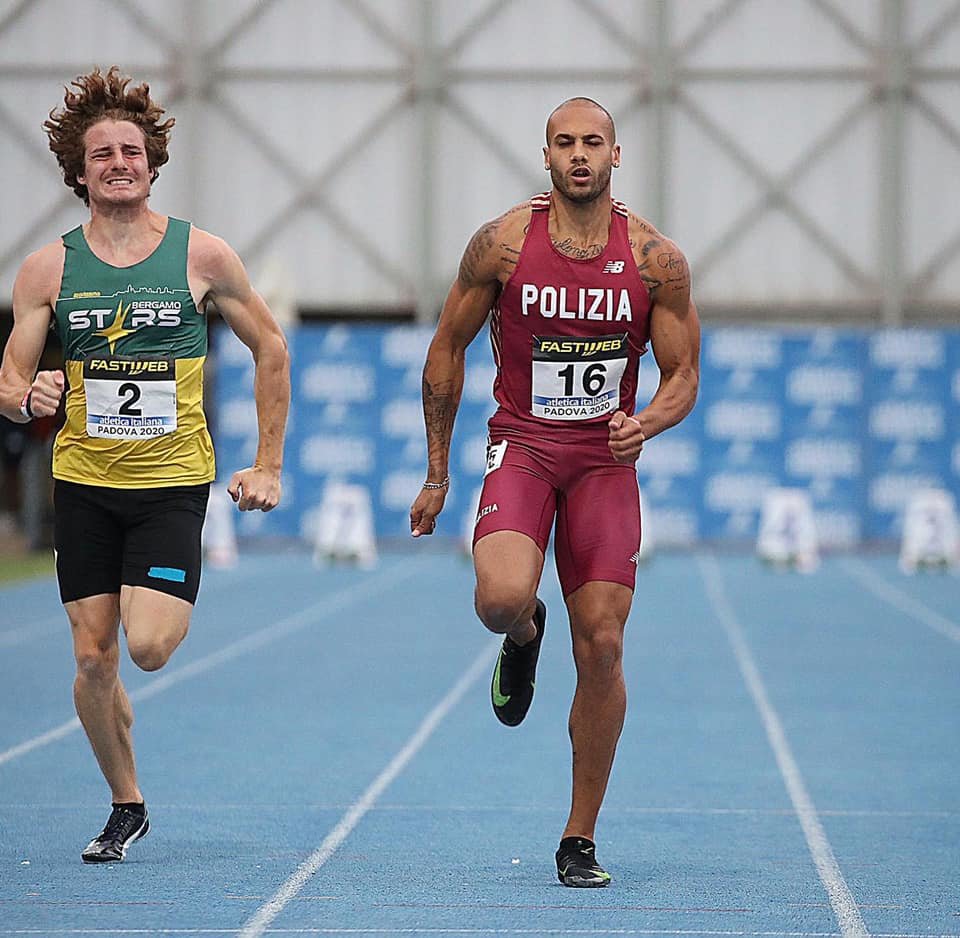
Lamont Marcell Jacobs raises his gold medal to his lips after winning the men’s 100-meter sprint at the Tokyo Olympics. Photo courtesy of Lamont Marcell Jacobs/Instagram.
The “World’s Fastest Man” was born in Texas, and his father was a soldier in the US Army.
But when Lamont Marcell Jacobs took the Olympic podium in Tokyo Monday night to receive his gold medal for winning the 100-meter race Sunday, the flag that was raised highest in the stadium was that of the nation he calls home: Italy.
A lifelong Italian despite his US roots, Jacobs, 26, won the track and field 100-meter with a time of 9.80 seconds Sunday night, beating a star-studded field of sprinters in the race that unofficially dubs the winner the World’s Fastest Man. Jacobs was a surprise winner, beating out favorites Fred Kerley of the US by 0.04 seconds and Canadian Andre De Grasse by 0.09 seconds.
“I really don’t know anything about him,” Kerley told The Associated Press. “He did a fantastic job.”
Jacobs wasn’t a known name until he became the world’s fastest, and even he is surprised by the upset.
“I think I need four or five years to realize and understand what’s happening,” Jacobs said.
Jacobs’ Instagram feed, using the Italian word for “gold.”
View this post on Instagram
Despite his American roots, Jacobs playfully insisted after the race that he is all Italian, telling The Orange County Register only his “muscle fibers are American.”
Jacobs’ father, Lamont Marcell Jacobs Sr., met his Italian mother, Viviana Masini, while stationed in Italy. The two married and returned to El Paso, Texas, where Jacobs was born. But when his father was assigned an unaccompanied tour in South Korea in 1994, his mother returned to Italy with Jacob, then less than a month old. The couple separated soon after.

As he grew up in Italy, Jacobs remained estranged from his father, but a reconnection in recent years was a key step to his improved running, according to Today. A “mental” coach told Jacobs that connecting with his father would free him of unresolved stress.
“This was a difficult path for me because I had not met him, known him, or talked to him in many years,” ESPN quoted Jacobs as saying on Twitter after his record-setting win. “[Reconnecting with him] gave me the desire, the speed, that something more that helped me being here and win the Olympics.”
The senior Jacobs now lives in Dallas and reached out to his son before the race in a text: “You can do it, we are with you.”
The sprinter said those words were on his mind as he prepared at the starting line.
“For sure I was expecting to come here and do a great Olympics because I was in great shape,” Jacobs said in Italian, as translated by Time, at a press conference. “My real goal was to get to the final and after that to run as fast as possible.”
Read Next: Final Round: All-Marine Wrestling Team To Disband After Tokyo Olympics

Noelle is a former staff writer for Coffee or Die through a fellowship from Military Veterans in Journalism. She has a bachelor’s degree in journalism and interned with the US Army Cadet Command. Noelle also worked as a civilian journalist covering several units, including the 75th Ranger Regiment on Fort Benning, before she joined the military as a public affairs specialist.
BRCC and Bad Moon Print Press team up for an exclusive, limited-edition T-shirt design!
BRCC partners with Team Room Design for an exclusive T-shirt release!
Thirty Seconds Out has partnered with BRCC for an exclusive shirt design invoking the God of Winter.
Lucas O'Hara of Grizzly Forge has teamed up with BRCC for a badass, exclusive Shirt Club T-shirt design featuring his most popular knife and tiomahawk.
Coffee or Die sits down with one of the graphic designers behind Black Rifle Coffee's signature look and vibe.
Biden will award the Medal of Honor to a Vietnam War Army helicopter pilot who risked his life to save a reconnaissance team from almost certain death.
Ever wonder how much Jack Mandaville would f*ck sh*t up if he went back in time? The American Revolution didn't even see him coming.
A nearly 200-year-old West Point time capsule that at first appeared to yield little more than dust contains hidden treasure, the US Military Academy said.












